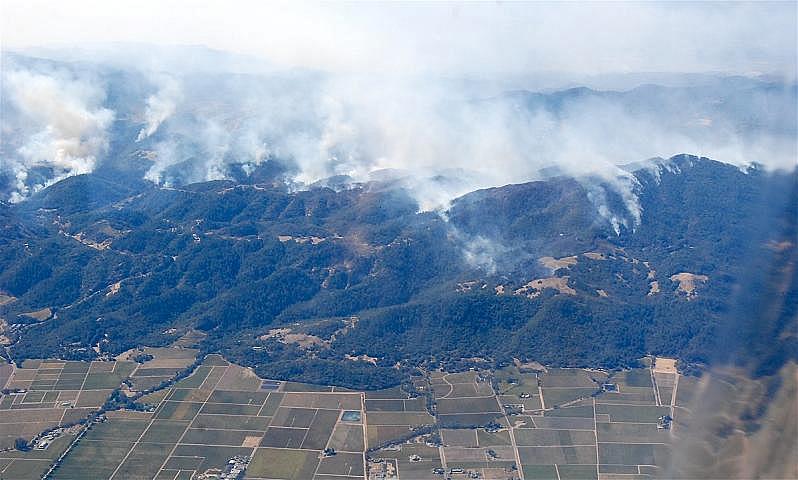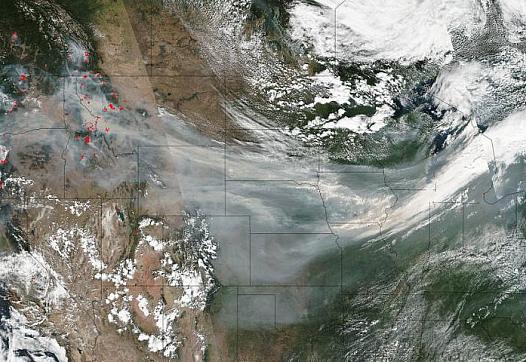Wildfire smoke protections leave some with questions - others celebrate progress
The story was originally published in Northern California Public Media with support from our 2022 California Fellowship.

photo credit: Courtesy of the California National Guard
Living and working in the midst of wildfires and the smoke they produce is becoming a more prevalent part of late summer life in Northern California. The consequences of breathing wildfire smoke without proper protection can last well after the smoke has cleared. For Sonoma County's agricultural workers, those dangers can be acute, but progress has been made.
"She reiterates how they've been fighting for this cause for a long time." Sandra de Leon said through translator Peter Morales Garcia. "And now that they're finally seeing something being done about it, that she can't help feel happy."
In August, after months of contentious government meetings, and organizing by both workers and employers, new protections for agricultural workers entered into law through the Sonoma County’s Ag Pass program. In part due to accounts from workers detailing wrongs.
Some, like de Leon, are taking the time to celebrate what they see as a hard-fought victory. Others still feel there’s a ways to go.One worker, who asked to remain anonymous to avoid any potential for retaliation or being passed over for work, shared his thoughts via translator.
"Just treating more like people because they are, they're often treated more as things rather than actual people and that he wants more equality within the workers." The worker said through Morales Garcia.
The call for greater official agricultural worker protections in Sonoma County got louder after 2020’s Wallbridge-LNU complex fire. County supervisor Lynda Hopkins represents the district where much of that fire burned.
"We achieved some substantial acknowledgement of human dignity and rights for farm workers." Hopkins said.
As noted by Sonoma County officials, there is still potential for abuse within the regulatory framework.
Ag worker Anabel Garcia, who has pushed for greater protections within mandatory evacuation zones, described her experiences during previous fires.
"She has had to work and that not only had they had to put their health at risk, but their families are because they have to leave them behind that they were not provided any masks and pretty much had to make do with what they had." Garcia said via translator.
Again, Sandra de Leon through a translator.
"One of the first times she worked after the 2017 fires, she had to work directly in the smoke and she relates how a specific moment when they were picking grapes." de Leon said. "It almost felt like the ash was part of the grape while they were picking, and that worries her."
Since 2017 in Sonoma County there have been ten inspections opened by CalOSHA into farm labor contractors, crew leaders, and management service companies. Seven of those inspections have resulted in fines.
Hopkins said the Ag Pass program is meant to increase oversight and reporting.
"And then we also directed staff to come back with enforcement, you know, and ensuring that there is some kind of a complaint hotline that farm workers could access." Hopkins said. "If someone is violating the terms of the Ag Access Pass. I think one of the really critical things is ensuring that farm workers feel safe to be able to question whether the program is being followed."
But when it comes to protections against wildfire smoke, the new Ag Pass protections defer to CalOSHA regulations.
"CalOSHA has a very minimal presence in Sonoma County." County Supervisor Chris Coursey said.
His concerns about wildfire smoke protections stem not only from CalOSHA’s minimal enforcement presence, but from ambiguous language within the regulations.
"We've got language in this that says when the particulate level gets to a certain number, they have to provide N95 masks, but we don't actually require anybody to have N95 masks available." Coursey said. "I think a requirement to have a stock of masks on hand at all times when you're in an evacuation zone is not an unreasonable request, but that's not included."
As it stands now, If an employer measures an air quality index reading below 151 at a job site they do not have to provide protective respiratory masks. Even at an AQI reading above 151, an employer is not required to provide respiratory protection if work will occur for less than one hour. For reference, anything measured above 100 on the air quality index is considered unhealthy.
Despite the lax thresholds of the new regulations, at least they are something, say workers like Garcia.
"She's very proud and happy of all the work they've done in that the battle they've been having is not in vain." Garcia relayed.
And de Leon.
"During the first set of fires, they never were provided any sort of masks and they, if they wanted any, they had to buy it themselves." de Leon said via Morales Garcia. "Or they had to use, bandanas, which really didn't help. And now that they have to provide them, she's feeling very happy that they have to consider the fact that they help contribute to their profits. So to be finally be treated with any sort of respect is very good."
The slate of new laws, statewide and locally acknowledges the reality of the consequences climate-related issues have on our health. Time will tell how well these efforts to safeguard the people who care for and grow what we eat and drink will work.
Reporting for this series was done in collaboration between KRCB and the USC Annenberg Center for Health Journalism 2022 California Fellowship, with translation from Peter Morales Garcia.


